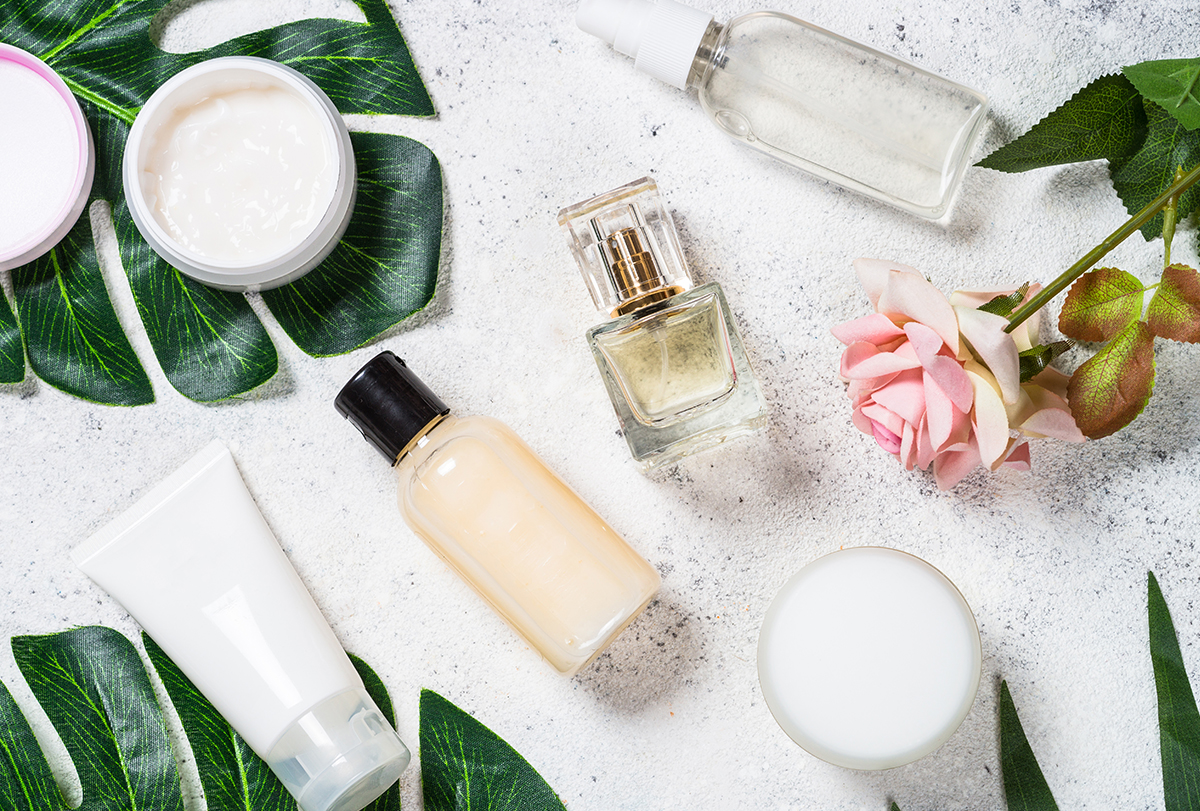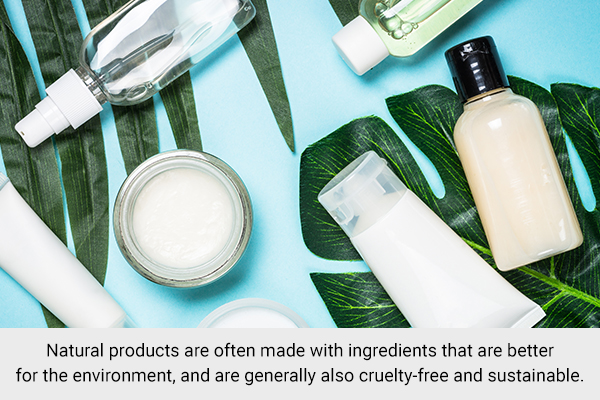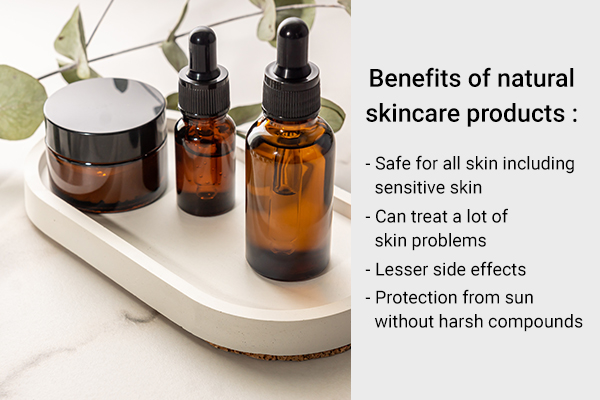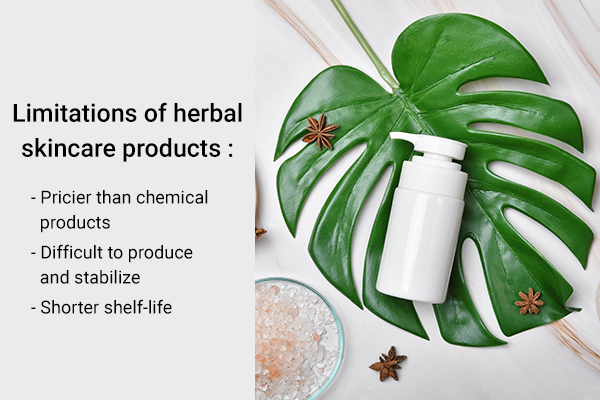In this article:
The question of which between natural and chemical skin care is best is a complex one, and the answer ultimately depends on individual preferences and skin type.

Natural skin care products are made from ingredients found in plants, and hence, they often don’t contain harmful chemicals or synthetic compounds. These products are generally considered gentler on the skin and may be a good option for those with sensitive skin or allergies. (1)
Chemical skin care products, on the other hand, often contain synthetic ingredients that are developed to treat distinct skin problems such as acne and fine lines. These products are touted for being more effective and delivering faster results. (2)
However, according to studies and experts, natural skin care products might be the way to go. (2) Read on to find out why.
Why Are Natural Skin Care Products Better Than Chemical Skin Care Products?
Here are some of the reasons why natural skin care products are preferred over chemical skin care products.
1. Less possibility of adverse effects on the skin
According to research, natural skin care products are often better than chemical skin care products because they are less likely to cause skin irritation, allergic reactions, and other adverse effects.
Chemical skin care products can be bad because they may contain harmful chemicals that can affect human health, such as the following:
- Fragrances are widespread in cosmetic products, and they can cause sensitizations, allergies, and skin irritations. Some fragrances are also classified as skin sensitizers and weak allergens, exposing consumers to mixtures of allergens. (3)(4)
- Preservatives in cosmetics, such as parabens and chlorphenesin, may cause adverse health outcomes, including allergic contact dermatitis, hypersensitivity reactions, and cancer. These chemicals have considerable negative effects on human health, especially on sensitive groups, such as teenagers and children. (5)(3)
- Triclosan is an antimicrobial additive found in cosmetics that is considered potentially harmful to health. Prolonged use of triclosan can lead to an increase in bacterial resistance to common antibiotics, and this substance can be found in fish’s fatty tissues and maternal milk. (3)
- Benzophenone-1 and benzophenone-3 are chemical filters used for protection from UV radiation in sunscreens, but they are endocrine disruptors that can cause negative effects on humans such as delays in neuronal development and alterations in behavioral development. (3)
- Toluene, found in nail paints, can cause skin irritation. In fact, it has been documented as an ingredient that can cause reproductive problems and also has negative impacts on the body’s nervous system. (3)(6)
- Acrylates and polysorbates are also considered weak irritants and can contain toxic residuals that have allergenic activity. Also, petrolatum is widely used in cosmetics but can contain impurities that can be harmful. (3)
2. Environment-friendly and cruelty-free

Natural products are often made with ingredients that are better for the environment and are generally also cruelty-free and sustainable.
Many people also prefer natural products because they believe that they are more compatible with the body’s natural processes and can provide more gentle and long-term benefits for the skin. (3)
Benefits of Natural Skin Care
In recent years, natural skin care has gained popularity as a form of complementary and alternative medicine (CAM) in America. Many people are turning to herbal supplements, both orally and topically, as a way to take care of their skin.
These products often contain plant-based ingredients that have been used in traditional or folk medicine for a long time.
Many different botanical ingredients are available today that are believed to have positive effects on the skin, making it easier than ever to find a natural skin care solution that works for you. (7)(1)
Herbal products sourced from plants have been widely used for cosmetic and skin-related conditions due to their numerous advantages. These advantages are as follows.

1. Safe for all skin including sensitive skin
Researchers highlight the potential drawbacks of chemical skin care products in those with sensitive skin, such as skin allergies, irritations, and other side effects. (3)
But since natural skin care products are produced using nonsynthetic compounds, such as natural oils and plant extracts, they can effectively treat skin issues without any harmful side effects. (7)
Natural skin care products also contain strong antioxidants that can hinder aging-related skin problems and can give you young-looking skin. (8)
2. Can treat a lot of skin problems
Natural skin care products offer therapeutic benefits due to the natural compounds they contain such as alkaloids, flavonoids, and essential oils. These compounds have antioxidant, anti-inflammatory, antiviral, and other properties, which can be beneficial for treating various skin disorders. (9)
Common skin issues that can be improved with the use of herbal skin care products include:
- Acne: Tea tree oil, green tea, chamomile, aloe vera, and neem are some of the herbs that can be used to treat acne. (10)(11)
- Psoriasis: Aloe vera, colloidal oatmeal, chamomile, and licorice are some of the herbs that can be used to treat psoriasis. (10)(11)
- Eczema: Chamomile, calendula, and chickweed are some of the herbs that can be used to treat eczema. (11)
- Signs of aging: Aloe vera, pomegranate, soybean, and green tea are some of the herbs that can be used to treat signs of aging. (12)
- Rosacea: Green tea, licorice, and feverfew are some of the herbs that can be used to treat rosacea. (10)
- Hyperpigmentation: Licorice, green tea, arbutin, soy, acai berry, turmeric, and pomegranate are some of the herbs that can be used to treat hyperpigmentation. (10)
Note: It is crucial to know that the effectiveness of herbal products may differ based on your skin type and the severity of the condition.
3. Has fewer side effects
According to research, natural skin care has fewer side effects than chemical skin care. Chemical skin care products may contain chemicals that can cause side effects.
The use of bioactive compounds derived from natural sources, such as plants, has shown promising results in the treatment of many dermatological disorders, including acne, psoriasis, and eczema, among others, with lesser side effects. (13)
4. Protects from the sun without harsh compounds
Research suggests that natural skin care products such as sesame oil may be better options than chemical-based products when it comes to protecting the skin from the harmful effects of UV radiation. (14)(15)
Inorganic filters such as titanium dioxide (TiO2) and zinc oxide (ZnO), which are commonly used in chemical-based sunscreens, have been found to be reasons for dermal toxicity and contact allergy. (9)
In a study, a herbal sunscreen containing sesame oil and 6% EAPE (Elaeagnus angustifolia purified extract, a natural extract rich in flavonoids and polyphenols) showed a high sun protection factor (SPF) of 16.03, and the formulation remained stable during 8 weeks of storage, highlighting the possible future of natural sunscreens. (15)
Limitations of Herbal Skin Care Products

While there are various benefits to using natural skin care products, there are a few limitations too, which include the following.
1. Pricier than chemical products
Natural products are generally priced higher than chemical-based cosmetics because of the increased processing and extraction requirements. This is supported by a study where 87.1% of respondents stated that chemical-based cosmetics are cheaper than natural cosmetics. (7)
2. Difficult to produce and stabilize
Although natural skin care products have numerous advantages, they also have some drawbacks, the most important one being difficulty in their production and stability management.
Natural ingredients can sometimes undergo crystallization, produce undesirable colors or odors, and encounter other stability issues in formulations.
Natural preservatives can be used to replace synthetic ones, but it’s not always easy to find the most sustainable option. Therefore, these products are harder to develop. (15)
3. Shorter shelf life
Natural cosmetics usually contain plant-derived materials that can promote microbial growth, and these products use only a few traditional preservatives or no preservatives at all, which can result in a shorter shelf life.
This would require fast utilization of the product and buying a new product every now and then. (7)
Benefits of Chemical Skin Care Products
Chemical-based skin care products have some benefits over natural ones. They contain strong preservatives that hinder the growth of microorganisms, giving them a more extended shelf life.
Moreover, they offer a wide range of components, including vitamins, antioxidants, minerals, herbs, hormones, anti-inflammatory compounds, and fragrances that can improve the overall health and appearance of the skin. The incorporation of these compounds allows for more targeted and effective treatments for various skin issues. (7)
Most-Asked Questions About Natural Vs Chemical Skin Care Products
Are natural skin care products always better than chemical ones?
Not necessarily, experts explain that while natural ingredients can have benefits for the skin, it is important to remember that not all chemicals are harmful and not all natural ingredients are safe for everyone.
What are some commonly found chemicals in skin care products?
Some common chemicals found in skin care products are parabens, sulfates, and artificial scents. (15)
Are chemicals in skin care products harmful?
Some chemicals in skin care products have been found to have harmful effects, such as endocrine disruption and skin irritation. (15)
Are natural skin care products as efficacious as chemical products?
Yes, natural skin care products can be as efficacious as chemical ones. Experts share that many natural ingredients have been found to have beneficial effects on the skin, such as improving hydration, reducing inflammation, and boosting collagen production. (11)
Do I need to switch to natural skin care?
Whether or not to switch to natural skin care products is your choice. It is crucial to take into account your skin concerns, as well as the ingredients and potential benefits of the products you are using.
Final Word
The debate over natural versus chemical skin care is not a simple black-and-white issue. Both types of products have their benefits and drawbacks, and what works best for one person may not work for another.
However, natural skin care products might be a little better as they can offer more gentle and soothing ingredients. Still, the best approach is to find a balance between natural and chemical products that work for you and prioritize the health and well-being of your skin.
- Was this article helpful?
- YES, THANKS!NOT REALLY


